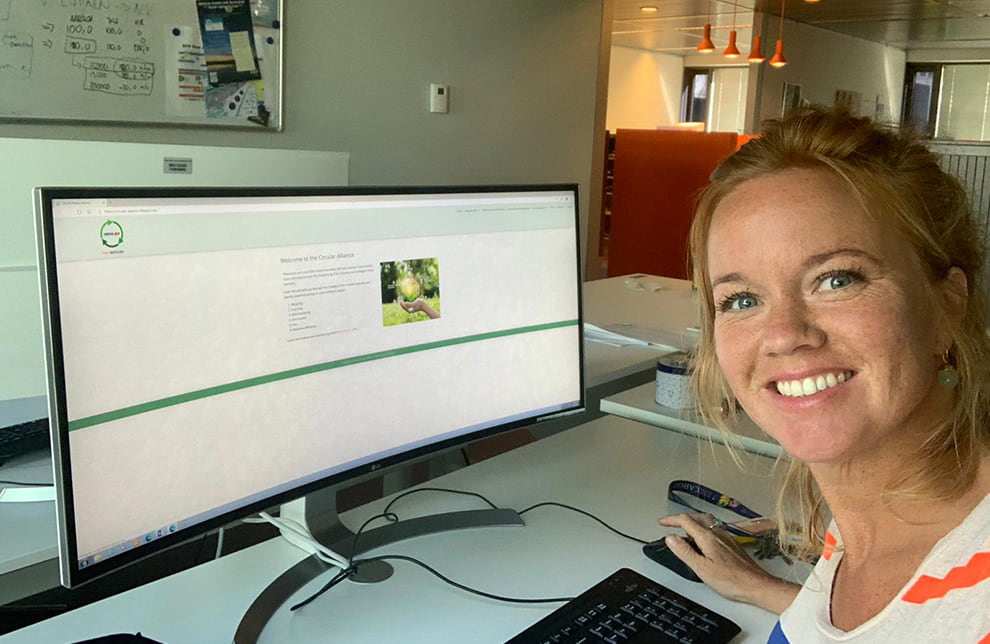Think of Schiphol, and you likely think of the millions of passengers that usually fill its halls every year. But during the pandemic, when passenger airline flights declined significantly, cargo airlines stepped up to accommodate the worldwide demand for (medical) goods. For Roos Bakker, Director of Business Development for Cargo, the past few months have been busier than ever. And she and the cargo team worked around the clock to make sure her partners got the full Schiphol experience.

Gepubliceerd op: 20 augustus 2020
Efficiency in flight
Some people are surprised that cargo often arrives here by plane. This is especially so for time-sensitive or expensive goods, such as flowers or high-tech materials. Before the virus hit, roughly half of the cargo arrived at Schiphol in the belly of passenger flights. ‘Many airlines utilise available belly capacity to make passenger flights more cost-effective,’ Roos explains. ‘And this is an effective and sustainable way to transport cargo.’
Beyond the belly
The Netherlands is an interesting marketplace for airfreight. But when the virus hit, this increased even further. The need for PPE materials in Europe gave room for more direct cargo flights into Amsterdam. Many airlines that normally do not fly to Amsterdam landed here to deliver medical supplies. The vast Dutch road network made sure all these goods were distributed quickly and efficiently to their final destinations.
‘From one day to the next, it was a whole new world,’ Roos recalls. ‘There are only three people on the cargo team, and we suddenly started getting an avalanche of calls about scheduling full-freighter flights to land at Schiphol. We were literally working 24 hours a day, 7 days a week for our partners to accommodate their needs.’
For the cargo partners, the new circumstances held some hidden opportunities. Being able to fly directly to Schiphol saved time, money and ecological footprint, as the final leg of the journey no longer needed to happen on the roads. Flights could be scheduled at the last minute, and incoming cargo flights for some airlines tripled.
Contributing to the fight
Another impact was that essential medical supplies got to the Netherlands very fast. ‘Because we were already used to working closely together with Dutch government, Slot coordination, Customs officers and other cargo partners, we managed to give top priority to freighter planes carrying medical supplies and PPE,’ Roos says. ‘Being able to accommodate these flights here at the airport helped healthcare workers to continue to fight the virus and protect themselves at the same time. It felt good to make that small contribution to the fight.’
For Roos, it was also a moment to highlight important initiatives her cargo partners had taken on. ‘Many cargo partners have upgraded their fleets and are flying quiet, sustainable aircraft, which is a top priority at Schiphol. This was an opportunity to show all the potential that cargo has, and how they are working on a more sustainable industry.’
Staying smart for the future
For Roos, the road ahead includes continuing the efforts to make Schiphol the Smartest Cargo Hub in Europe. ‘In these crazy corona months, we saw a lot of benefits from the work we’ve already done to make cargo smarter, more efficient and more sustainable,’ she says. ‘And as we move forward, we’ll take those benefits with us to shape a new cargo reality in the years to come.’
Although the focus now needs to be on helping the entire airline industry recover from this unprecedented year, Roos says she looks forward to taking the Smart Cargo Mainport Program to the next level. ‘The teamwork and cooperation we had before and during the crisis will continue after it,’ she says, ‘so that we can work together to create the best experience for our cargo partners, and for Schiphol.’